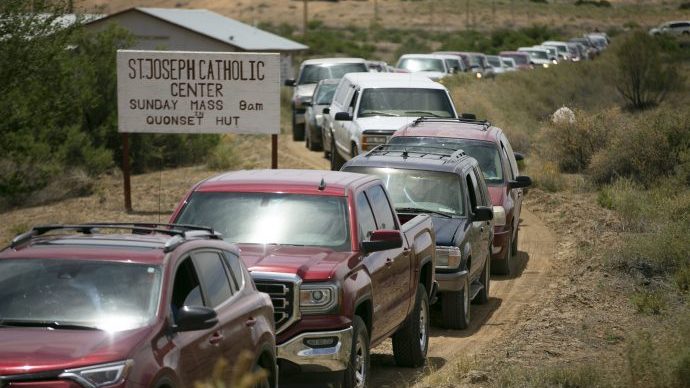COVID-19 infection rates in the Navajo Nation surpassed that of New York last month, giving it the unwanted distinction of having the highest per capita infections of any place in the country and placing a strain on already over-taxed Catholic ministries in the region.
The Navajo Nation, which encompasses portions of Arizona, New Mexico, and Utah with a population of 173,667 as of the 2010 census, has been devastated by at least 5,661 confirmed cases of the virus - a reality that Catholic Extension, which works to support some of the poorest regions in the country, believes could further cripple one of the nation’s most abandoned and forgotten communities.
“Pandemics reminds us that the poor will be the first to suffer and the last to recover in terms of health and in economics,” said Joe Boland, Catholic Extension’s vice president of mission, which has been active in the Navajo Nation since the ministry’s founding in 1905.
“The pandemic has shined a light on the perennially harsh realities that they face,” Boland told Crux, adding that Catholics must be committed to the “long, hard work of accompaniment…otherwise they will be forgotten again.”
Sister Theresa Chato, director of religious education at Our Lady of Fatima in the heart of the Navajo reservation, already had a tough job before the region entered one of the strictest lockdowns in the country.
Her parish in Chinle, Arizona is home to approximately 800 parishioners, many of whom live together in multigenerational dwellings - often lacking running water and dependent upon gas instead of electricity - and in a region where even pre-pandemic unemployment was estimated at close to 70 percent.
The parish’s food bank was already a popular spot before COVID-19 hit the region, but now Chato estimates they are feeding 400 families through a highly choreographed distribution program that takes place every other week.
She told Crux that the entire system operates as a drive thru, with volunteers taking intakes as to what each family needs, and then the food is collected and placed in the trunk of the vehicle without ever making physical contact with the individual picking up the supplies.
In addition to food insecurity, in collaboration with the local chapter house, which manages the community administration and affairs, they are also distributing natural gas propane and providing hay for the horses, cows, and sheep.
“In addition to the food, we think about the animals and necessary survival needs of gas and water,” she noted.
Although the governors of Arizona and New Mexico have allowed for church services to resume, Masses and other sacraments are currently suspended due to the high infection rates throughout the reservation.
Yet for Chato, the presence of the church is still strongly felt as they continue to find new ways to create a culture of encounter and accompaniment, even if it looks differently than before.
“I am so moved by the resilience of the people,” she told Crux. “They are a people of hope.”
Meanwhile 121 miles away in Zuni, New Mexico, Father Pat McGuire, says the past three months have been “disheartening” as he has had to shepherd a usually tight-knit community through the realities of social distancing.
Most individuals rely on selling handmade jewelry or pottery to earn a meager income, and now, no one is around to buy their wares. Along with economic despair, the emotional toll compounds the already bleak circumstances.
McGuire, a missionary priest from Scotland, told Crux that Catholics have been in the area since the 17th century and his particular mission parish has been active since 1920 with the Catholic schools being a source of hope and a unifying institution for the region, as they’ve sought to integrate their cultural traditions with Catholicism.
The 71-year-old priest, who serves three churches, two of which are located on the Navajo Nation in Chichiltah and in Ramah, said that there’s been a “big emptiness” knowing that the schools are closed and the parish is only open for a few hours a day for adoration, but he said that being trained as a missionary reminds him that now more than ever, the Church can be a witness to meeting both the physical and spiritual needs of the people.
While neither Chato nor McGuire hail from the region, where Catholic Extension supports 15 poor parishes and missions that spread across the vast area of the Navajo Nation, roughly the size of West Virginia, they’re proud to call it home.
Boland notes that throughout the Navajo Nation, unemployment numbers are off the chart, diabetes plagues many of the people, many homes lack running water, and drug and alcohol addiction are a constant challenge.
“Most people can’t believe you’re describing the U.S.,” he says of the utter poverty that exists, adding that they are “circumstances that your average American can’t wrap their mind around.”
“A lot of Americans don’t realize that injustices run so deep,” he said, but noted that one upside of the current moment is that the “Navajo community is now in the national spotlight.”
Whether or not the people of this region will be forgotten again once the pandemic has passed is another question.
For Boland, even if the limelight of the present moment fades, he wants the Navajo people to know they will not be forgotten.
“We’re here to remind people of the loving presence of God,” he said of the work in the region. “We want to help people find God in their lives in circumstances that are very difficult, and we’re in it for the long haul.”

